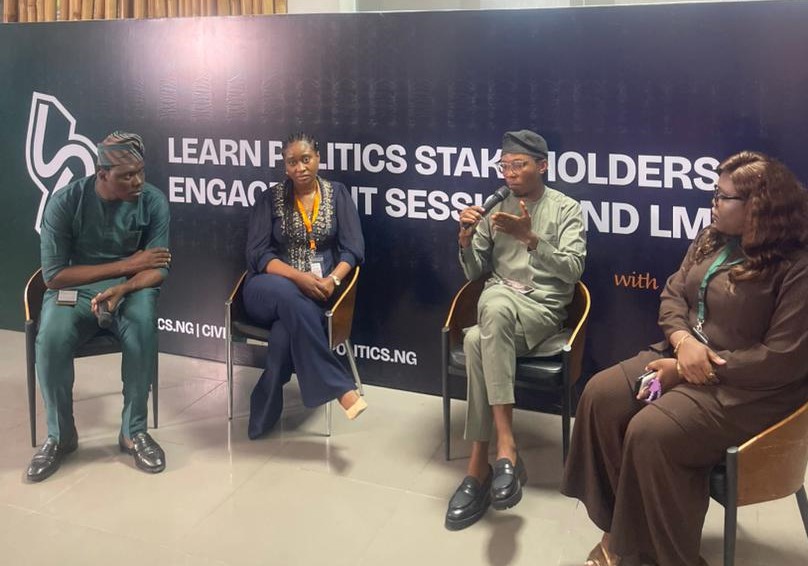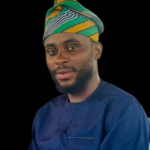|
Getting your Trinity Audio player ready...
|
At the Learn Politics Civic Education Programme, held at Civic Hive on Friday, 10th October, discussions centred on civic education, political participation, and youth engagement in governance.
Findings revealed that youth participation declined from 34.2 percent in 2019 to 28.6 percent during the 2023 general election. Against this backdrop, Learn Politics engaged stakeholders on promoting civic education to drive active political participation, especially among young people.
Founder of Learn Politics, Victoria Oladipo, stated that the decline in youth participation in politics and governance is the reason why the organisation was founded.
According to her, the mission of the organisation goes beyond teaching them what politics is, but making them see how politics lives.
She stressed that youths should be active participants in political processes and demand accountability from the government.
“Since the EndSARS protests, there has been a noticeable decline in youth participation in politics and governance. Strategies such as community sessions, active citizens hangout, and civic education programmes are part of what we do,” she said.
During the keynote address, Joseph Amenaghawon, head of Civic Hive, spoke on reimagining civic education in order to adequately inform citizens and drive positive change.
According to him, civic education is about how best to make ordinary citizens know about governance. He stated that civic education began from home; however, it is often biased due to cultural and religious issues, creating a challenge for civic participation.
Amenaho listed leadership and the education system as challenges limiting civic participation in the country.
“ Poor leadership and widespread political apathy have weakened the country’s civic education, particularly among young people. Except there’s a national reimagination of mindset, it would be hard to choose leaders who are not limited by parameters ( religion and culture), he said
“An education system which does not place value on critical thinking will continue to bring people who are uninterested in governance.”
The event featured panel sessions discussing strategic steps young people can take to participate fully in governance.
In one of the panel sessions, Glory Ukwenga, Executive Director of Africana League and producer of House of Commons, emphasised the importance of collaboration among civic organisations in order to avoid duplication of roles.
She said it was important that organisations support each other’s programmes instead of going about the same, even with the knowledge that some organisations are already in that field.
“Typically, without losing identity and resources, we have to identify each other’s strengths and then come together to design programs that allow for each other’s strengths to evolve on specific project components,” she buttressed.
“That way, you all pull resources together in terms of funding and can make a greater impact,” Glory emphasised.
ROUNDCHECK was part of this conversation, represented by the Executive Director, Caleb Ijioma.
How Youths Can Be Actively Involved In Civic Participation
Emphasising that Nigeria’s greatest opportunity lies in the youth, Amenaghawon said that young people must extend access to Civic education beyond the urban centres due to low internet penetration in the country.
“With technology, young Nigerians are reimagining civic education, turning hashtags to movements. However, there’s a need to connect to people who live in semi-urban and rural areas when reimagining civic education. Many people are encouraged to have local connections,” he said.
Ufuoma Udeh from Enough is Enough Nigeria, highlighted several ways that can be utilised in order to make the average Nigerian interested in politics and governance through civic education.
According to her, Nigerians have to be shown the consequences of not engaging in governance, as many of the problems encountered by most of them are a result of bad governance.
Ufuoma placed emphasis on taking the conversation about governance to young people using the language they understand, to make them interested and drive conversations.
She however warned that in a bid to make politics and governance interesting, the importance of what is being discussed should not be watered down.
Temidayo Musa, Lead Operations and Programme at Civic Hive, emphasised the need for local government engagement with the people as the grassroots is where governance begins due to their proximity to the common man.
“Local governments are the closest to the people. There should be more town hall meetings and avenues for engagement. Not that you’re the local government chairman for Bariga and you’re staying in Lekki. Accessibility and responsiveness are key,” he said.
The highlight of the event was the launch of the Learning Management System (LMS) developed by Learn Politics. Titled Understanding Policies and Political Science, the four-module course will empower 500 young people in Lagos State with political knowledge and critical thinking skills for effective civic participation.









